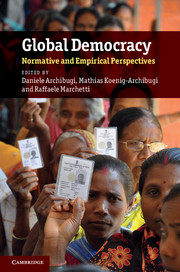Book contents
- Frontmatter
- Contents
- Figures
- Tables
- Notes on contributors
- Acknowledgements
- 1 Introduction
- 2 Models of global democracy
- 3 Citizens or stakeholders?
- 4 Is democratic legitimacy possible for international institutions?
- 5 Cosmopolitan democracy
- 6 Regional versus global democracy
- 7 Towards the metamorphosis of the United Nations
- 8 Flexible government for a globalized world
- 9 Global democracy and domestic analogies
- 10 Global democracy for a partially joined-up world
- 11 Civil society and global democracy
- 12 Global capitalism and global democracy
- 13 From peace between democracies to global democracy
- 14 The promise and perils of global democracy
- Index
- References
5 - Cosmopolitan democracy
Neither a category mistake nor a categorical imperative
Published online by Cambridge University Press: 05 June 2012
- Frontmatter
- Contents
- Figures
- Tables
- Notes on contributors
- Acknowledgements
- 1 Introduction
- 2 Models of global democracy
- 3 Citizens or stakeholders?
- 4 Is democratic legitimacy possible for international institutions?
- 5 Cosmopolitan democracy
- 6 Regional versus global democracy
- 7 Towards the metamorphosis of the United Nations
- 8 Flexible government for a globalized world
- 9 Global democracy and domestic analogies
- 10 Global democracy for a partially joined-up world
- 11 Civil society and global democracy
- 12 Global capitalism and global democracy
- 13 From peace between democracies to global democracy
- 14 The promise and perils of global democracy
- Index
- References
Summary
Introduction
Under globalization, individuals' opportunities, life plans and choices are influenced not only by the political decisions of their own national governments, but also by various non-state actors. Regional and international organizations set up by states themselves, and powerful private actors such as transnational corporations, affect the opportunity space and choices of individuals directly. Other such actors have great indirect effects, by influencing the scope of decisions available to national governments, the expected results and thus the strategies that states pursue – with important consequences for citizens.
Such globalization affects the value of even well-functioning democracies which can no longer buffer their own citizens from the effects of actors outside their territorial borders – if they ever could (Ruggie 1982). Thus, many are concerned about the global structures that frame the opportunities and choices of individuals: the rules and practices that specify the actors, the scope of decision they may take and that influence their choices. Some actors such as states and interstate organizations are legally authorized to make binding decisions, at various territorial levels that often overlap, such as the European Union (EU) and United Nations (UN) bodies. Other actors such as transnational organizations or regulatory networks are evidence of more diffuse forms of ‘governance’: they have de facto power to get things done, sometimes without legal competence to command compliance (Czempiel 1992, Rosenau 1992).
- Type
- Chapter
- Information
- Global DemocracyNormative and Empirical Perspectives, pp. 96 - 114Publisher: Cambridge University PressPrint publication year: 2011
References
- 3
- Cited by



